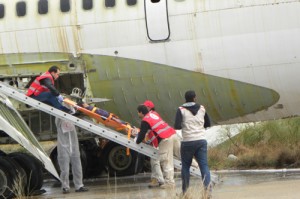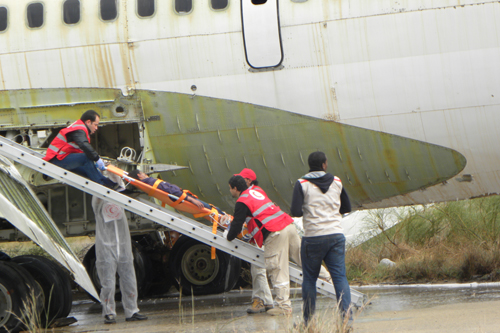Tripoli, 18 January:

The International Committee of the Red Cross (ICRC) and the Libyan Red Crescent are increasingly moving towards training rather . . .[restrict]than direct support in the country, according to the ICRC’s latest operational update.
The humanitarian organisation, which provides help for people affected by conflict and armed violence, has been running courses across the country to ensure that medical staff and emergency workers receive much-needed training.
One of these was a one-day session on disaster management and response, put on by both organisations, along with the Ministry of Health. It was attended by 150 people, among them participants from 12 government and civil society organisations, including the National Safety Authority.
The training, which took place at Tripoli’s Mitiga airport, simulated an airplane crash. Communication with appropriate authorities, rescue, the immediate medical support of casualties, and transportation of the injured to hospitals were all covered in the exercise.
One of the participants, Dr Hani al-Hadi Hussein, a surgeon at the Tripoli Central Hospital, said that he was impressed with the way the training, the first of its kind held in Libya, was organised. He added: “I hope that it will contribute to an improvement in coordination among emergency services.”
“Many volunteers and doctors lost their lives during the war,” said Abdulhamid Madani, secretary-general of the Libyan Red Crescent. “We must ensure that our organisation and all involved in relief activities in emergency situations are ready to take action if the need arises. Being ready could help us save many lives.”
The ICRC said that many parts of the country remain littered with weapons that continue to maim and kill people, especially children.
To help medical professionals deal with weapons-related injuries, in December the ICRC held a two-day seminar in Tripoli, which was attended by 120 doctors from across the country. The seminar covered trauma surgery, treatment of wounds caused by the remnants of war including mines, bullets and shrapnel, and the rights and obligations of medical personnel under international law.
The ICRC has also trained more than 80 Libyan Red Crescent volunteers, at ‘Train the Trainer’ courses in Khums, Zawia and Sebha. The participants will now be able to provide first aid training in their own localities. [/restrict]










